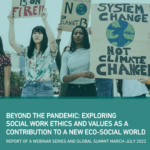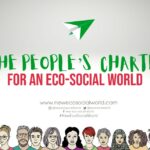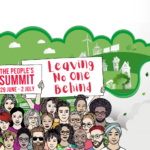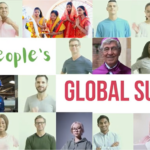Home › Forums › Live Open Mic Forum › Decolonising and Valuing Indigenous Knowledge
- This topic has 18 replies, 10 voices, and was last updated 1 year, 9 months ago by
Rose.
-
AuthorPosts
-
June 29, 2022 at 9:23 am #7053
Omar
ParticipantHi everyone,
A key theme for me so far in the co-building of this People’s Summit as well as discussed throughout the presentations, is the need to value indigenous and diverse forms of knowledge. This links in with decolonising the social work profession, education and knowledge of how we engage with individuals, families, communities, institutions, and global networks. From my involvement in international work, it is clear that there is much to learn from indigenous and diverse forms of knowledge, and that we need to understand that indigenous peoples are of global representation through migration, with knowledge, culture, and values becoming transnational and globalised as well. It is difficult to value diverse forms of knowledge and achieve social change when Western, Eurocentric, and White knowledge dominates locally, nationally, and internationally our engagement with knowledge. The discussions are happening in this People’s Summit, and I believe we need to continue our engagement with indigenous and diverse forms of knowledge, think critically and actively about valuing this, and moving towards a decolonisation of our work and engagement with knowledge in order to truly empower everyone and not leave anyone behind.
I would be happy to discuss this further if anyone would like to share comments, thoughts, perspectives around this. How do we move fowards to this goal?
June 29, 2022 at 9:30 am #7055simon
ParticipantI’d agree with all of that and its so easy to fall into the view that the world only exists in our little bubble. At the same time I think that there is a huge tendency for us to be dragged into the whole PC debate in social work education. It is so important that we arent afraid to stand up as social workers and for our values
June 29, 2022 at 2:55 pm #7108Richard
ParticipantI would like to dialogue. Our Ubuntu workshop speaks to the need to SHRINK the dominant canopy of pre-20thC Western science (reductionist, separateness, observer objectivity, etc). Growth of 20thC science and regrowth of indigenous science/knowledge needs to expand to have a genuine co-science and practice canopy. Blackfoot Physics book by David Peat in the early 2000 speaks to this co-ness. Significant changes are needed to the IFsW Ethical Principles statement if the profession is to be serious about walking-the-talk of co-building.
Richard Ramsay, CalgaryJune 29, 2022 at 7:30 pm #7133Georgianna
ParticipantI would agree Omar! We cannot maintain this work if we keep making the assumption that we’re the only ones that have made these connections. I’ve been wondering how to find balance with acknowledging, respecting, and using indigenous knowledge without appropriating or posing harm in the way I use it. How are others navigating this balance?
-
This reply was modified 1 year, 9 months ago by
Georgianna.
June 30, 2022 at 9:40 am #7180Sarah
ParticipantGeorgianna – this is such a challenge. There seems to me to be a real danger of, for example, taking a philosophy of life/way of being and living such as ‘Ubuntu’, and turning it into a one-word slogan as an answer to the world’s problems. It then becomes meaningless and abstracted from context, as well as (inappropriately) appropriated. I think ‘westerners’ like me can only try to appreciate and learn from indigenous and other worldviews/ways of living to give a new perspective on my own approach to life and stimulate critical perspectives on norms, assumptions and values in my own dominant culture.
June 30, 2022 at 6:40 pm #7230Rene
ParticipantThis is an important discussion. Our panel on Plural pathways and shared principles to co-building health in a new Ecosocial World (https://newecosocialworld.com/summit-programme/d2-concurrent8/) discusses
approaches to health and wellbeing in India, Latin America, East and Southern Africa and small island states that reflect a plurality of indigenous cultural understandings of health and also common features of collective interests, complementarity, and reciprocity, and in positioning health as a consequence of harmony with nature and spiritual forces. While subjugated to biomedical, biosecurity approaches during colonialism, across these settings, rights-based, social medicine approaches confronted the alienation and inequities generated by colonialism and exacerbated by neoliberalism, reviving early principles and adding new dimensions to confront an extractive globalisation, gender and other intersecting inequalities. So in line with what was raised earlier, its not the slogans and names but the shared values, principles, ways of constructing knowledge that we need to draw and communicate from these ideas and systems, together with what has enabled renewal and resistance to efforts to dominate and suppress them. (We really welcome comment on the panel!)June 30, 2022 at 7:05 pm #7232Richard
ParticipantI haven’t had a chance to attend the panel. Hopefully, a little later this afternoon and then share a comment. I am in Calgary (mtn zone). Keen on continuing the dialogue on this important theme. Our Ubuntu workhop has a graphic to illustrate the “canopy” shrinking that is needed to allow the growth and regrowth and remergence of other ways of knowing/sciences so that the power in the prefix “co” can really happen locally and globally -cobuild, codetermination, collaborate, cooperate, coexist ……
June 30, 2022 at 7:17 pm #7234Rene
ParticipantThat would be great Richard- can you share the link to your panel please to listen to it please to better understand the ‘canopy shrinking’?
I think in talking about ‘indigenous knowledge’ we shouldnt exclude also organic knowledge, such as the knowledge collectively generated by workers in self-determined participatory processes linked to struggles to expose risks and burdens, to change working life and conditions, or to resist the externalisation of burdens in extractives. They bring critical learning from action.June 30, 2022 at 8:02 pm #7237Richard
ParticipantI tried a cut and paste that doesn’t seem to work
Go to the Ubuntu workshop part of the program. It is UC006. I wasn’t happy with my recording. Too slow and sometimes plodding. The positive side of recording is the ability to fast forward or scan the text if the audio is taking too long. The canopy slides are near the end show the dominance of the current canopy and the overshadowing/longtime suppression/dismissal of others. After the 7 transformational Ethical Principles changes we are encouraging dialogue around, we show what we believe to be a more desirable and co-equal canopy.June 30, 2022 at 8:16 pm #7238Georgianna
ParticipantThank you! I am looking forward to listening to these valuable sessions! I would agree that ensuring we represent things with appropriate attribution and call to mind the connecting threads is a starting point to approaching this for sure.
July 1, 2022 at 12:50 am #7246Richard
Participantthank you to Rene and all the panel members for a diverse and inspiring panel dialogue. I really like the way it was planned and organized to bridge between all the experiences. A little of my context. Although I am clearly the product of a rural, western Canadian, living most of my adult life in urban Calgary, I have had the good fortune to have some other cultural and lived experiences. Some of this was as a member of IFsW executive for many years, most of them as treasurer. I had the honor of holding the Tata Institue Chair in social work in the mid-90s and helped one of our students experience an international practicum experience working with low-income farmers in Kerala. I had the opportunity write about history and paradigm shifts over several centuries in the Indian Journal of sW (199). I was worried then that the prof was largely trapped or frozen in the pre-20th century version of science (the biomedical model you addressed) and risked being several paradigm shifts behind by the dawn of the 21st century. Here we are 1/4 into the 21st calling for game-changing paradigm shifts in all sectors. I was struck by several key words woven into many of your individual and collective remarks: conception, holistic, biomedical, solidarity, plural pathways, space for debate. Finding a common conceptual framework/model for social work is a longtime interest. Holistic too has been a long time interest. I was introduced to systems thinking in grad studies in the 60s. Holistic became clearer when I connected with Buckminster Fuller’s work on Whole systems and Nature’s basic coordiante system, the tetrahedron, which is also the molecular structure of the carbon atom – the essence of life. Holism for me is now spelled with a “w”. sadly I think holism is still mostly rhetoric for many. The togetherness meaning of solidarity has intrigued me for quite awhile. When you connect it to reductionist science’s quest for a basic building block and the 20th century quantum science and the reemergence of indigenous sciences/knowledge that there is no building block to be found; it is all about relations, the meaning is right but the word is wrong. solid is fixed, rigid, compact, etc. Plurality has a hard time emerging with this concept. It in my opinion the word keeps us somewhat trapped in the very paradigm we are trying to transform. Plural pathways connect me to Fuller’s definition of unity. Unity is not oneness; it is plural, minimum two. Creating space, safe space is so important as the panel made clear throughout. Debate is important. I like what I have learned from David Bohm’s work on Undivided and Divided Wholeness worldviews and the importance of genuine space for dialogue, reflection, listening, and most important hearing and respecting others with genuiness. I would love to dialogue further and explore some of the conceptioning work I have tried might be able to map the messages and inspiration of the plural pathways panel into a conceptual model that can “house” and advance what you have presented on co-building a better world for everyone.
July 1, 2022 at 10:50 am #7300Sylvia
ParticipantWe talk about using different lenses in social work to be able to see the same issue from different theoretical view points. I think it would be really powerful if we can learn to use a lens that has a less anthropocentric view of the world. Nature has value outside of what use it has to humans and many indigenous cultures give us a better perspective on that than the dominant colonialist culture that has led to the development of neo-liberalism & its associated problems.
Yet when I was taught about social work theory this type of world view was missing. I was lucky to read the work of Val Plumwood who pointed out that when the white people invaded Australia they treated the perspective of the Aboriginal people as being child like and illogical. Yet I think it is now accepted that human life needs all those other entities to live so we are connected.
However in practice it is still common for system/society to act as if we humans are separate. Our connection to non-human entities is rarely treated with the seriousness of human to human connection. Many services do not have space for the non-human family members and many times a worker may not even ask about the non-human entities that are important to people – this includes place as well as other non-human animals. In the dominant culture today it would be unusual that a person would not want to move if moving meant they could get a job. A child’s love for an animal that happens to be a rooster or sheep is not enough to stop that animal ending up on the family dinner table and people who sit in trees or chain themselves to bulldozers to stop a forest being destroyed are not usually portrayed as heroic. The stereotype is that they are weird probably with lower hygiene standards and they just need to grow up, get a haircut and a real job and start contributing to society in a useful way. Too often part of being an adult in many societies is learning how view the connection to our ecokin as second class.
July 1, 2022 at 1:37 pm #7307Rene
ParticipantThank you Richard for the thought provoking feedback and reflections, shared also with the colleagues from the other regions. I need a bit of time to digest your comments (and those from Sylvia, Georgiana and Sarah) and the ideas in your panel Richard and will come back to this later today to continue …
July 1, 2022 at 1:51 pm #7309MARIA JESUS
ParticipantSylvia comments that we should learn to have a less anthropocentric worldview. We can learn very much about “ubuntu” and about the philosophy of “buen vivir”, but how to apply it in other contexts that are more individualistic (in European countries, for example)?
July 1, 2022 at 7:15 pm #7351David N Jones
ModeratorI heard recently from a senior cardiac doctor, in a radio programme, that cardiology is the field of medicine with the highest proportion of research based practices – in other words actions which doctors and surgeons take to treat heart problems which are guided by robust research. Yet only 15% of practice is guided by robust, double-blind, highest level research (in the sense of what is recognised by the medical profession). In other words, 85% of the practice is NOT research based but derived from applying practice and experience. Other fields of medicine have LOWER ratios of research informed practice. In the light of that, social work compares not badly. We should robustly defend experience informed (including indigenous) social work practice whilst always looking to test the relevance and effectiveness of what we do and being ready to learn and change.
Sir Martin Landray on saving over a million lives – BBC The Life Scientific https://www.bbc.co.uk/programmes/m0018ns0
-
This reply was modified 1 year, 9 months ago by
-
AuthorPosts
- The forum ‘Live Open Mic Forum’ is closed to new topics and replies.






